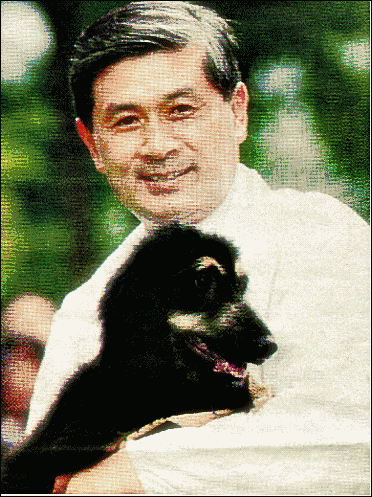'I was blinded by work'
Dato' Dzulkifli Abd Razak
Article
- Learning Curve - New Sunday Times - 01/15/2006
THE education world rejoiced when TIME magazine (Dec 27, 2004) named Korean Dr Hwang Woo-suk as one of the People Who Mattered in 2004.

A FIRST: Dr. Hwang and cloned Afghan Hound Snuppy
The choice seemed appropriate at the time. Veterinarian Dr Hwang Woo-suk was the first to clone human embryos capable of yielding viable stem cells that might one day cure countless diseases.
He became a celebrity, a hero and a treasure for Asia's technological powerhouse overnight.
Last year would have been another landmark for science, a rare honour for Asia - ahead of American and European counterparts.
It was a year of opportunities, specifically for South Korea, to showcase its newfound biotechnological talents.
After all it is an academic dream to be the first in the world in important discoveries such as the cloning of human embryo through scientific research.
Indeed Dr Hwang also has the honour of being the first to successfully clone a dog, an Afghan Hound named Snuppy. His work is the result of a 40.5 million won (RM151,000) investment in his research and facilities since 1998. Good science is expensive.
The Science journal (May 2005) published Hwang's claim of having created 11 stem cell lines matched to patients, raising hopes of creating customised therapies for hitherto incurable diseases.
But the hopes are now in a limbo. Dr Hwang has slipped from the pedestal of scientific honours and his reputation is now in tatters.
What was hailed as a breakthrough in human cloning has become what some feared most - breach of bioethics in scientific research.
In response, Seoul National University commissioned a panel to determine whether Dr Hwang created patient-matched stem cells as he claimed.
Last Wednesday, the South Korean government stripped Dr Hwang of his status as the country's pre-eminent scientist after the panel found that he fabricated his research into stem cells.
Dr Hwang recently admitted to "fatal errors" in the Science report and has asked the journal to withdraw the paper.
Indeed, some alleged that the fabricated results are a symptom of how sensitive bio-health research is.
Done hurriedly, without much ethical considerations, and with a lack of rigorous checks and balances, the result can be a disappointment and may be dangerous.
A professor at Korea's Hankook University of Foreign Studies remarked that the scandal is tied to the "faster is better culture" and has major repercussions for the international scientific and academic community.
"Koreans have a reputation among Western academics as being diligent but lacking in originality and creativity," he says, pointing to the fact this stereotype seems to bear out.
Earlier, Dr Hwang had admitted that as part of the groundbreaking stem cell research he published in 2004, one of his colleagues had paid for egg donations. Two unpaid donors were Hwang's junior researchers.
He had lied about the source of the eggs to protect the privacy of his female researchers.
He is reportedly said to be unaware of the Declaration of Helsinki, a set of ethical principles for the medical community regarding human experimentation, which clearly enumerates his actions as a breach of ethical conduct.
Dr Hwang has resigned from his post at a new stem-cell research centre. The reputation of his research team took a heavy toll.
Consequently, his other works, including another Science article in 2004 on the world's first cloned human embryos (as acknowledged by TIME) and in the journal Nature on the first cloned dog, will also be under scrutiny by the panel.The journals are reviewing his work.
As the events unfold, the major worry among the scientific community is that the controversy will further raise scepticism among critics on the fledging field of stem cell science, despite its many groundbreaking promises.
The deepening intrigue and findings can only fuel unending debates about experiments involving life sciences, and biotechnology in general.
The Korean stem cell controversy is not new although it highlights fraudulent practices in the world of science and technology.
It underscores the "secretive" nature of science that creates a gulf of knowledge between laymen and professionals, making it less transparent and accountable.
While many want to be involved in the exciting field of biotechnology, the notion of ethics is not normally emphasised.
To quote Dr Hwang: "I was blinded by work and my drive for achievement." For some, it is fame and wealth.
But scientific discoveries must be governed by strict principles of ethics. Otherwise, as the panel remarked: "This kind of error is a grave act that damages the foundation of science." This is a vital lesson to keep in mind.
